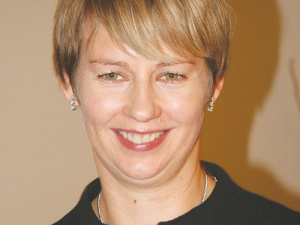MPI Hails Kiwifruit Boom as Horticulture Revenue Surges Past $9 Billion
Ministry for Primary Industries (MPI) Director General Ray Smith is giving a big shout-out to the horticulture sector, especially kiwifruit.
 NZGI’s Nikki Johnson says the low unemployment rate makes it difficult to fill all the available positions.
NZGI’s Nikki Johnson says the low unemployment rate makes it difficult to fill all the available positions.
The kiwifruit industry welcomes more Recognised Seasonal Employer (RSE) workers for next season but must still work hard to attract the rest of the required workforce.
This is the message from New Zealand Kiwifruit Growers Inc (NZKGI) chief executive Nikki Johnson.
NZKGI is pleased the Government has approved a large increase in the number of RSE workers -- by 1750 to 12,850 nationally.
In 2018, Bay of Plenty, where most of the kiwifruit industry is based, took about 2000 of the national total of 11,100 RSE workers. Details are still being worked out but it looks like in 2019 Bay of Plenty can expect about 300 more RSE workers.
“The additional RSE workers will contribute to alleviating the pressure of the labour shortage but the industry will still need to work hard to attract the rest of the workforce required,” Johnson says.
RSE workers make up fewer than 20% of the seasonal workforce in kiwifruit.
“While the increase is welcome and will provide stability to our workforce, the industry still has the challenge of attracting the remainder of the workforce that we need. Employers must provide RSE workers with accommodation and pastoral care.
“While NZKGI considers there is sufficient resource to support the RSE workers for the 2019 season, accommodation is an issue that needs to be addressed as the industry continues to expand.
“A number of new accommodation facilities are in progress at present and the industry has a working group which is considering the constraints to building new accommodation to make sure that we are prepared for increased need as the growth of the kiwifruit industry continues.”
Johnson says NZers are the kiwifruit industry’s first priority but the low unemployment rate makes it difficult to fill all the available positions.
“RSE employees make up a small but crucial proportion of NZ’s horticulture workforce which fills this gap that NZers and working holiday travellers can’t fill.”
Last year the Government approved a national increase of 600 RSE workers but this wasn’t enough to meet demand and a labour shortage was declared in several regions.
The national pipfruit industry organisation, NZ Apples and Pears, Hastings, expects an extra 100 new jobs in Hawke’s Bay every year to 2025, not including the need for more seasonal pickers.
“We are delighted with the Government’s decision to approve an increase in the RSE cap,” Apples and Pears chief executive Alan Pollard says.
“Our priority always is to create job opportunities for NZers,” says Johnson.
Positive first step
Bostock New Zealand owner John Bostock welcomed the increase as a “positive first step”.
“With the rapidly increasing apple crop and decreasing availability of NZ workers, the increase will go some way to relieving the labour shortage issues at the peak of the season.
“By increasing the seasonal guest workers it provides the ability to create more permanent full-time jobs for NZers.
“Full time jobs for NZers are important for resolving some of our social issues in the wider community.
“Bostock NZ will be looking closely at how the cap is allocated between competing regions and employers.
“It is vitally important that a fair, transparent and robust allocation criterion is used. Businesses that demonstrate strong growth need a greater allocation.”
T&G pipfruit NZ general manager Bruce Beaton says any increase in the RSE cap would have a “positive impact” for the business.
T&G was taking on the first of its RSE cohorts last week and expects to employ up to 1000 overseas RSE workers at a time during peak season in Hawke’s Bay.
Horticulture New Zealand (HortNZ) has added its perspective to numerous primary sector voices urging the Government to strengthen its draft legislation to replace the Resource Management Act (RMA).
The Commerce Commission has finalised new information disclosure requirements for local councils and water organisations that deliver water supply and wastewater services.
Beef + Lamb NZ (B+LNZ) is calling for significant changes to the Government’s reforms to the Resource Management Act (RMA).
NZPork says the Government needs to strengthen its proposed planning laws to ensure New Zealand's pig farmers can continue to produce pork.
Good news for kiwifruit growers - a record crop with forecast per hectare returns at record levels for all fruit categories for the 2025-26 season.
As guests gathered on what is known as the Speaker's Lawn - a beautifully manicured patch of grass behind the main buildings of Parliament - to mingle and enjoy a lamb chop to celebrate National Lamb Day, the mood was very much upbeat.

OPINION: The proverbial has really hit the fan in Wellington and exposed a glaring example of a double standard in…
OPINION: Dark suited spin doctors exist to, well, spin, and the nice cuddly progressive types at Greenpeace Aotearoa practice this…